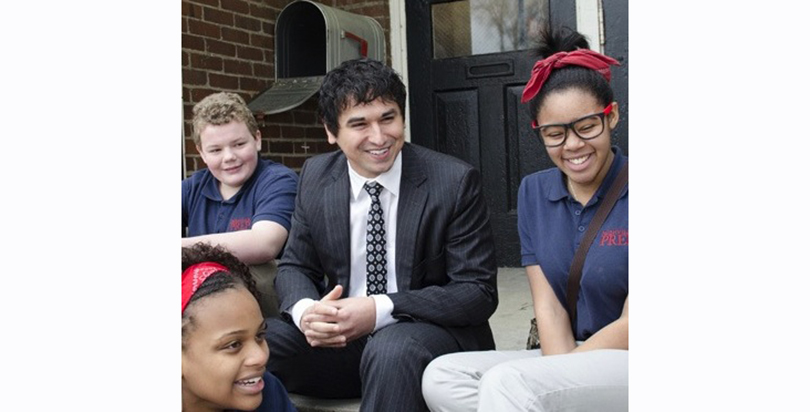74 Interview: RePublic Schools’ Ravi Gupta on the Next Frontier of the Education Reform Wars

Updated Sept. 12. See previous interviews: Secretary of Education Arne Duncan, former U.S. Senator Tom Harkin, current U.S. Senator and education committee Chairman Lamar Alexander and University of Michigan economist and New York Times contributor Susan Dynarski. Full 74 Interview archive here.
In the charter school world, Gupta and his schools have drawn outsize attention for three reasons: The student outcomes are stellar; the schools are located in the South, where there are few charters; and RePublic students learn computer coding in the early grades.
What he told The 74 about resistance to charters from some parents in Nashville, and what he has to say about the shortcomings in the school movement, both in Nashville and nationally, are likely to surprise:
The 74: Describe your personal history.
Gupta: I attended public school in New York City for the elementary and middle grades, and I came away with a sense of the real promise of public education but also a sense that things needed to get dramatically better. After working for the Obama campaign, I next worked at the United Nations, where Ambassador [Susan] Rice put me on a project building partnerships in the education community. One of those partnerships was with the Harlem Children’s Zone, which blew me away. I also got to visit other high-performing charter schools in New York. It was breathtaking work.
How did you get into charter schools?
I saw a couple of great networks in action, Democracy Prep and Uncommon Schools, and asked their leaders how to get into the field. I asked John King [co-founder of Roxbury Prep, now U.S. secretary of education] and Seth Andrew [then-CEO of Democracy Prep] how to get involved, and they all suggested I get in touch with [Boston-based] Building Excellent Schools. I was accepted as a fellow there, and when it came time to choose a location, I chose the South, where kids have the lowest economic mobility of anywhere in the country. I ended up in Nashville and then later expanded to Mississippi.
(Read: The 74: Meet The Grandmother of America’s Best Charter Schools)
Describe your RePublic school network.
We have six schools now. The two flagship schools, Nashville Prep and Liberty Collegiate Academy, both opened in 2011. Nashville Academy of Computer Science opened three years ago, and Republic High School opened last year. Our first school in Mississippi, ReImagine Prep, opened in Jackson last year, and Smilow Prep, our second school in Mississippi, opened this year.
What does your academic track record look like?
Our flagship schools have ranked in the top 5 percent of all public schools in Tennessee in terms of both academic growth and absolute achievement. Our students are predominantly low-income students of color. Our flagship schools have also ranked as the top two performing charters in the state by both the Tennessee Department of Education and Stanford’s CREDO.
Have you seen public schools adopt any of your practices, especially the software coding courses for which you are known?
Our coding curriculum has been picked up by over 30 schools throughout the South, both charter and district schools. We have offered our curriculum and teacher training to Metro Nashville Public Schools. Despite all the rancor around education reform, I continue to believe this is an area of collaboration, where folks can put down their swords to work for what’s best for all kids. I’m cautiously optimistic that this will happen.
You came to Nashville at the height of charter school acceptance, with Race to the Top, encouraged by a pro-charter mayor. Describe how the political environment there has changed since.
I first got to Nashville in 2010, which turned out to be the high-water mark of the pro-reform environment. Nashville was getting Race to the Top money, Kevin Huffman was arriving [as commissioner of the Tennessee Department of Education], and Chris Barbic [founder of YES Prep charter schools] was arriving to oversee the Achievement School District [which took control of the state’s lowest-performing schools, converting some to charter schools]. Charter schools were in vogue, and community leaders were tripping over themselves to express support for reform and charters.
Given the recent school board elections in Nashville, where the balance swung against charters, I gather things there have changed?
The pendulum has swung in the other direction. Now it’s fashionable to bash charters and school reform. According to recent polling, however, the public in Nashville is generally supportive of charter schools. So I assume the debate now will be over to what extent charters will grow or not grow, and what role they will play in the larger system. I predict a slowing of charter school growth there and more of a focus on sharing best practices. I think we will also see a new group of reform leaders who will talk differently, look different, and have different priorities.
What happened there?
In any reform movement, you’re going to see a pendulum swing just due to the costs of change. Barring a widely acknowledged crisis, it’s hard to sustain major reform in a system, especially if politically powerful and privileged folks have something to lose. The people who have something to lose [from reform] — property owners with access to the highest-performing schools — have emerged as a strong political force.
The second reason is that the reform community in Nashville must do some soul-searching. There’s a new bureaucracy of reform organizations. They lack diversity, make competing claims on educator and parent time, lack authenticity and diversity, and are totally unaccountable to key stakeholders. When I attend education conferences now, which I do less these days, it’s hard to find folks who are actually working in schools. This growing reform bureaucracy needs some creative destruction.
Another setback is we’ve had a hard time getting the Fourth Estate to report actual results of charter schools, which are pretty high. Charter schools, despite serving only about 10 percent of students, represent the vast majority of high-performing schools — according to both the district and state performance frameworks. And when you take into consideration the fact that charters in Nashville serve more students of color, more economically disadvantaged students, more students with disabilities — and have lower mobility and student discipline incidents — the results are even more incredible. But this miracle has been underreported at the expense of innuendo and anecdotes.
I gather the biggest pushback to charters comes from the white middle and upper-middle classes?
Upper-middle-class parents’ property values often guarantee them access to higher-quality schools, so they inevitably benefit when someone is excluded from those schools. With school choice, you are going to have people with something to lose.
Now, we’re starting to see some charters — [New York’s] Success Academy, [Denver’s] DSST, [California’s] Summit — serving some parents in higher income brackets. I believe that is going to be the next frontier in the reform wars.
Of course, that creates a catch-22 for charters. If opponents see middle-class kids getting enrolled, they will complain that charters are “creaming” the best kids. The charters that maintain a traditional focus on poor and minority children will get accused of contributing to educational segregation. So it’s important for folks to know that the trap is coming. And it’s important for everyone, especially the press, to point out when the goalposts get moved. It’s similar to the more familiar catch-22 with charters: If a charter performs poorly, it gets ridiculed. If a charter gets strong results, it gets accused of teaching to the test. There’s no way to win.
Is the political mood any different in Mississippi?
Yes, the mood there is dramatically different. In Jackson, almost everyone recognizes that the city is in an educational crisis. And there’s a much stronger level of collaboration there between reformers and defenders of traditional public schools. In Mississippi, both sides worked to support full funding for public education and to oppose vouchers. That kind of collaboration does not exist in Nashville.
What are the strategies for moving the public more in favor of embracing high-performing charters?
First, the charters have to continue to produce strong results. Don’t take that for granted, and keep it front and center. Second, we need to reform reform. Apply some creative destruction to existing reform organizations. Third, we need to encourage charter schools to enroll different demographics. We need to broaden our stakeholders. And we need to empower a more diverse and authentic leadership corps. I am moving back to New York and will sleep well at night knowing that in my absence more people who grew up in these communities will be the future charter teachers and leaders.
Why did you decide to leave?
I grew up in New York City, and I miss my home. Plus, my mother is not getting any younger. But I wouldn’t trade those years I spent in the South for anything. Our parents, kids, and staff inspire me every day — and will continue to motivate me long after I leave.
Did the pushback movement have anything to do with your departure?
No. I grew up in Staten Island, New York — where the default conversation style is combative. I enjoy a passionate debate. But let’s all work to eliminate the insults and truly engage on the merits. We are far from that vision at the moment.
If I could do one thing by fiat to improve the education debates in Nashville, it would be to give everyone a hobby. If folks didn’t view their self-worth at stake in every Twitter battle, we would have more honest conversations. But there have been times when I wished everyone would have put down their swords and collaborated more.
What’s next?
At this point, I have to be a little circumspect. But here’s what I can say: I’m starting a new venture that will use cutting-edge technology to promote empathy, which is in short supply in our political space.
Get stories like these delivered straight to your inbox. Sign up for The 74 Newsletter

;)
